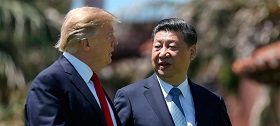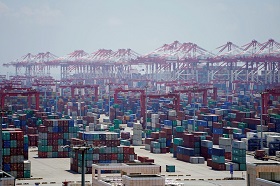Made in China: Why Would China Export its Governance Model?
(votes: 5, rating: 4.2) |
(5 votes) |
Graduate Student at MGIMO Ministry of Foreign Affairs of Russia, Bachelor of Foreign Regional Studies (East Asia Regional Studies: Economy and Politics (China)), Institute of Business Studies, RANEPA under the President of the Russian Federation
At the end of 2019, the topic of whether China seeks to export its development model to other countries, primarily developing economies, was widely discussed in the community of Chinese experts in the West. Some mention the statements made by President Xi Jinping in his numerous speeches about the advantages of the Chinese development model, which offers a new option to the current theories of governance. Others say that, in fact, China does not at all seek to export its political system to other countries (as Chairman Xi stated in 2017), since there is no obvious benefit for the country itself. Who is right or wrong and what should one know about the situation around the promotion of certain elements of the Chinese governance model globally?
It can be assumed that the inevitable expansion of China's economic presence in the world will be followed by intensified attempts to promote its political culture, which, although not an ideology, has similar goals. This includes laying the foundation for close cooperation with governments of countries sharing similar values. This is precisely what causes a certain clash between two management practices — the Western model based on democratic principles, and the new model proposed by the PRC. Following the advancement of the characteristic governance model, the PRC introduced certain elements of its political culture which brought the governance systems in other countries closer to Chinese realities. This gives China many opportunities to strengthen its position in certain regions and, of course, meets the goals of Xi Jinping, mentioned in his book, to eliminate the lack of understanding between China and other countries. This can probably be rephrased as follows: to better understand China, you need to become China. And for this purpose, a new type of political party system is an excellent alternative to the existing governance models. Just add — "with Chinese characteristics".
At the end of 2019, the topic of whether China seeks to export its development model to other countries, primarily developing economies, was widely discussed in the community of Chinese experts in the West. Some mention the statements made by President Xi Jinping in his numerous speeches about the advantages of the Chinese development model, which offers a new option to the current theories of governance. Others say that, in fact, China does not at all seek to export its political system to other countries (as Chairman Xi stated in 2017), since there is no obvious benefit for the country itself. Who is right or wrong and what should one know about the situation around the promotion of certain elements of the Chinese governance model globally?
Chinese Governance Model
The Chinese governance model, as one of the pillars of the development model that led to the well-known economic miracle, is a combination of one-party rule and controlled market economy. This allows for full control over the targeted allocation of resources. Strict control and maximum concentration of control levers in a single center are, perhaps, some of the characteristic features of the Chinese governance model. It is suitable for many developing countries that for a long time have had a one-party (or authoritarian) governance system with fairly strict state control. This is characteristic, in particular, for most countries of the African continent, thereby one can feel the strong influence of the PRC there.
Today, China made a conceptual design of a development model based on its own economic successes of the last 30 years. Xi Jinping has repeatedly told the world that China’s unique governance experience may be useful to other developing nations. In addition, the President of China began to talk about the importance of reforming the entire global governance system, mentioning that China is ready to lead this process. The PRC is already striving to bring certain elements of its own system into global practices. These, in particular, are various tools of tight control promoted by China at international platforms, for example, Internet governance.
The current form of confrontation between the United States and China for influence in developing countries is not associated with a specific value-based ideological model (be it socialism or liberalism), but with who can ultimately offer a more successful and effective form of governance. It is clear that the PRC will not rely on socialist ideology to advance its soft power and strengthen its position in individual states, as it will be perceived as a threat to impose an alien ideology and repeat the episodes of the Cold War period.

China is conquering Africa
Another thing is the desire to share the “best practices” of public administration, which only indicate the right path to achieving economic prosperity, but are in no way limited by any ideological framework. “Strong ruling party” is the precondition of efficient and good governance; "It should be the core of society with enough strength, and capacity to implement national development programs." Party competition, parliamentary discussions, and civil society are not mentioned in the Chinese model.
In a way, such recommendations implicitly promote one's own ideological attitudes. China’s desire to strengthen control over individual regions and countries, dictated primarily by economic interests, in particular, the need to ensure the consistent implementation of the Belt and Road Initiative, is quite noticeable. Enlisting the support of the governments of developing countries (many of which are highly corrupt and tend to be authoritarian, for example, on the African continent) without provoking a backlash, is only possible by refusing to directly impose the socialist ideology in favor of a milder promotion of its own political model as an analogue to generally accepted democracy.
Without underestimating the role of the economy as the main driver of enhancing the influence of the PRC in the developing countries of the world, it can be noted that the political thinking of a country similar to the one of the PRC can help establish bilateral cooperation with China. This will enhance contract conclusion for the implementation of various economic projects and receive support at international platforms (with the support of Africa, Latin America, Oceania, etc.) to strengthen the international authority of China. It is no coincidence that in October 2019 Mike Pompeo, U.S. Secretary of State, said that "Beijing was focused on international domination and needed to be confronted" by the U.S.
Reasons to Export the Model to Developing Countries
While some experts note that the export of the Chinese model is driven by the ambitions of the country's leader, who is increasingly concentrating power in his hands; others say that the main purpose of such a policy is to protect the dominant role of the CPC. However, it seems that the root causes of the Chinese governance model “export” are somewhat deeper.
The first and, probably, the main is the promotion of China’s value system, which is somewhat different from an ideology, since the idea to be followed is not clearly expressed. Countries are not invited to switch to socialism and completely reform the entire governance system. They are only given recommendations on how to improve the existing mechanisms by learning from China's success. The Chinese governance model better suits developing countries, since "people don't have enough to eat. Most are illiterate. Does Western democracy really work?" It is precisely along this line that two alternative models clash: Western democracy and the Chinese model, where the main emphasis is shifting towards prioritization of social stability, collective welfare, “survival and development,” while all individual rights and freedoms become a secondary concern.
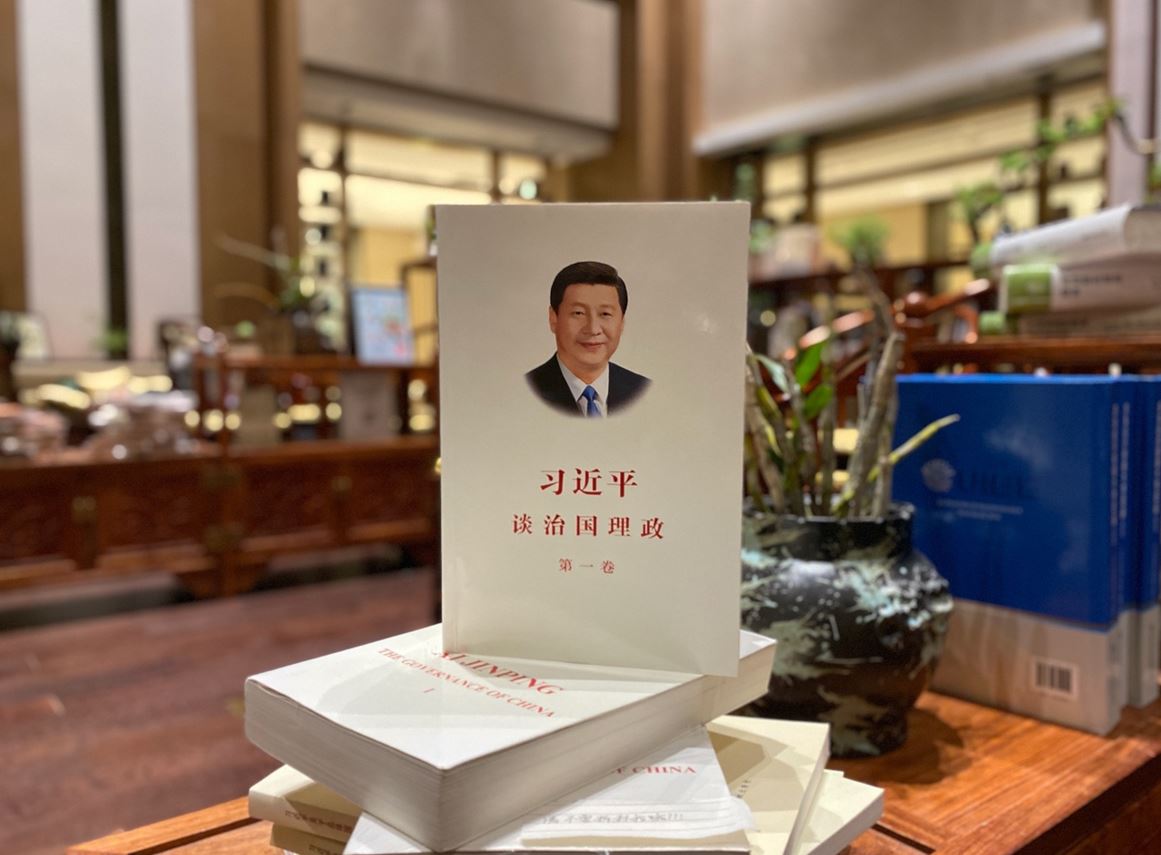
Photo: Danil Bochkov, International Plaza Hotel Lobby (国际交流大厦), University of International Business and Economics (UIBE, Beijing, China).
The conceptualization of a system of political thinking is supported by the fact that it was summarized in two volumes of Xi Jinping's The Governance of China (习近平 谈 治国 理 政), where the Chinese president sets out the basic principles of the country’s governance. The books are printed in huge numbers; you can see them in a prominent place in a large number of copies at any bookstore in China, not to mention university libraries.v
The preface to the first edition just says that the work was translated into many languages of the world and received positive reviews, the book aims "to respond to rising international interest and to enhance the rest of the world’s understanding of the Chinese government and CPC" [1]. At the very end of the first chapter, Xi Jinping leads this conclusion that "China needs to learn more about the rest of the world, and the outside world needs to learn more about China. I hope our friends from the press will continue their efforts for mutual understanding between China and the rest of the world" [2].
It is likely that one of the long-term goals of promoting the Chinese governance model is to narrow the gap in mutual misunderstanding. Back in 2017, Xi Jinping said that the Chinese model has proved its effectiveness, and now other countries and nations "who want to speed up their development while preserving their independence” have "Chinese wisdom and a Chinese approach to solving the problems facing mankind”. And in 2018, the Chinese leader announced a "new type of political party system”, devoid of many problems inherent in Western political systems, such as “endless power transitions and social chaos, inefficient government,” etc. And although most of these statements are aimed at internal audiences, they also inspire foreign governments in some countries.
China’s promotion of its own model has several goals: on the one hand, it should help to greatly simplify the communication with other countries (if the models are similar, it’s much easier to understand the functioning from the inside); and on the other, to unite like-minded countries around the PRC on the platforms of international organizations, where China is increasingly calling for global reforms of the entire system of international governance. Even if the individual voices of such like-minded countries are quiet, together they provide support to the image of China.
Another goal stems from the first and is associated with the promotion of the Belt and Road Initiative. It is no secret that some countries (Malaysia, Myanmar, Bangladesh, Sri Lanka, etc.) backed away from their commitments on the initiative. In order to guarantee a strengthened presence for years to come, the PRC needs to lay the foundations of close mutual understanding at the level of both senior leaders and the political elites (party, legislative, and executive) as a whole. Xi Jinping speaks about the importance of narrowing the gap at the level of basic mutual understanding in his book. This is necessary from the point of view of securing China in the markets where it already operates, and the ones it only plans to enter, but is facing a growing wave of discontent, which is directly related to the lack of understanding of its intentions.
Tools and Examples of Chinese Governance Model Promotion
China uses a variety of tools to popularize its model in developing countries. Basically, they can be divided into several channels: seminars and workshops, thematic conferences, training programs at universities, and personnel trainings. It seems that such mechanisms for promoting the Chinese model are not directly aimed at changing the political regime in a particular country. Their goal is more general — to change the attitude of states towards the PRC model, as well as to create a generation of officials who adequately perceive Chinese values and understand Chinese realities. This allows to partly narrow the ideological gap in understanding of each other. Despite the limited effect, the export of the Chinese model through popularization, rather than propagation, allows China to better convey its viewpoint of the outside world.
In 2017, XinhuaNet News Agency reported that the Chinese Academy of Governance, a training institution of the Chinese government, has trained more than 10 thousand foreign civil servants from over 150 countries in the past five years. In 2018, the new Baise Executive Leadership Academy (nestled in the remote Guangxi region) opened in China. The school has already trained more than 400 senior government delegates of Laos, Vietnam, and Myanmar over the 18 months since the launch. The training program is designed for officials from ASEAN countries, it lasts more than a week and covers topics such as the operations of Chinese Communist Party committees and the reform and opening up of China, how to “guide public opinion” online, and how to alleviate poverty in a “targeted” way (grassroots presence).
Other educational institutions of the PRC train not only civil servants, but also judges, police, and law enforcement officers. It is worth noting that, in popularizing its model, China attaches importance to inviting representatives of the ruling parties. Such an approach just indicates a fairly clear focus of China to specific political forces in specific countries, capable of most successfully embodying elements of a rigid one-party system.
At the same time, the effect of promoting the Chinese model is quite limited and rather local in nature, which is manifested in the emphasis on working with individual political forces and parties. Due to certain limitations of influence, it does not allow creating universal loyalty of the political elite of individual countries towards the Chinese model, and after a change in leadership or in the situation, the focus on the Chinese best practices also changes.
In 2011, Tunisian President Zine El Abidine Ben Ali was forced to flee the country under the pressure of the political crisis that started in 2010. Prior to this Zine El Abidine Ben Ali de facto had been following the Chinese model for more than 20 years of his authoritarian rule, as some international media wrote. Tunisia showed high rates of economic growth (about 5%) and was universally called the "Star of Africa." At the same time, the political regime remained authoritarian, with the dominant role of a single political party. The Chinese development model was applied and strengthened “stability for development, development for stability” as the basis for national policy, and economic growth as the ultimate source of legitimacy of the ruling regime. After 2011, Tunisia set itself on track of democratization, rejecting the model that had been implemented for decades before. However, at the moment, it has not yet been possible to fully attain stability in the country and ensure economic growth.
Ethiopia and Sudan are the most striking examples of the advancement of the Chinese governance model. Ethiopia is called one of the very first and China’s most “eager” student. The Ethiopian People’s Revolutionary Democratic Front (EPRDF) first sent a senior delegation to study in Beijing in 1994. EPRDF cadre training system has learned and imitated many aspects of the Chinese Communist Party's setups. This was largely due to the fact that party representatives were trained at the CPC Central Party School, where they were taught how to manage their own organizational structure, ideological work, propaganda system, cadre education, and relations between the central-local relations within the party. This type of training program was conducted for party functionaries from Sudan, South Africa, Namibia, etc. Representatives of the leading parties from Zimbabwe and Tanzania, as well as Angola and Ethiopia, also attended classes in China.
The role of China was most noticeably manifested in Sudan. Sudan was the original "gateway" for China to the African continent. China National Petroleum Corporation (CNPC) had been active in the country since 1995, later it was able to gain a foothold in the country's oil sector. At the same time, since 1989 China was developing very close political contacts with the Sudanese President Omar al-Bashir, ruling National Congress Party, the representatives of which attended CPC personnel trainings at the Executive Leadership Academy in Shanghai. As the party reformed itself in 2014, the PRC model was adopted, where competition takes place within parties, not between them. With the start of conflict in Darfur in 2003, China was blamed for supporting the central Government. In 2007, the Western media were highly critical of China’s position on the situation in Darfur, that was close to genocide of the local negroid population, and the upcoming Olympic Games in Beijing in 2008 were nicknamed the "Genocide Olympics". Since then the PRC has been gradually expanding its role as a mediator in the conflict, urging Khartoum to negotiate. One way or another, China had a great impact on the country's political leadership.
Another tool for promoting the Chinese model is the Forum on China-Africa Cooperation, that has been organizing exchanges for government personnel since 2006. The Ministry of Foreign Affairs and the Ministry of Commerce of the PRC are most actively involved in the educational programs, holding events, organizing conferences and training programs for authorities and the representatives of the ruling parties, telling about the successes of the Chinese reforms, culture, traditions and customs of China. In 1998-2014 CPC has forged links with 48 African countries at the level of regular exchanges and training programs. It can also be noted that the CPC supports African parties in independently determining and selecting the appropriate political system and development road to build their countries based on their own domestic circumstances and without foreign interference.
In 2018, it was reported that South Africa had been planning to create the Political School and Policy Institute for the country's ruling party, the African National Congress. The PRC initiated the project and allocated funding of presumably USD 75 million. CPC delegations regularly visit the country and also monitor the progress of the project. The institute will be modelled on the China Executive Leadership Academy Pudong in Shanghai — one of the leading governance schools of the CPC.
The CPC holds various types of events to popularize the Chinese model of development not only for developing countries, but also for EU member states. In December 2016, a CPC delegation exchanged views with European politicians and experts in Brussels.
Since 2016, the 16+1 format for cooperation between China and Central and Eastern European Countries, also called the China-CEEC, has also been a mechanism for interaction at the level of political parties. Parties of China and CEE Countries were enhancing Dialogue in 2017 (Bucharest, Romania), when the Chinese side noted that the political parties of China and CEE countries should share experiences about party and state governance, highlight policy communication and enhance political and strategic mutual trust. In November 2019, the CPC Central Committee representatives met with a joint study group of the ruling parties of several Central and Eastern European countries. CEEC ruling parties expressed their support for the Belt and Road Initiative. CEE countries are quite open about Chinese initiatives: Hungary stated that China, in contrast to the West, offered a new approach in international relations, and would “no longer divide the world into teachers and students but would provide the basis for mutual respect and mutual advantage”. The Serbian Progressive Party called the CPC “a natural ally,” and the Serbian President said that they needed to learn from the Chinese example, adding that some of the CPC's achievements could be repeated in Serbia, as well as to learn about the way the CPC implements its own conclusions.
Case Study: Training Courses for African Party Elites
Due to the lack of official statistics on the number of visits party representatives of African countries made to take training programs conducted by the CPC, it is difficult to determine the exact dynamics. However, according to the sources available, it can be summarized that significant growth occurred in the period of 2011–2013. (see Figure 1), after Xi Jinping took office. Later he formulates the thesis on the need to narrow the gap in understanding between China and the rest of the world in his book.
Figure 1. Leading African parties attending CPC training programs in the period 2009-2014, by the number of visits.
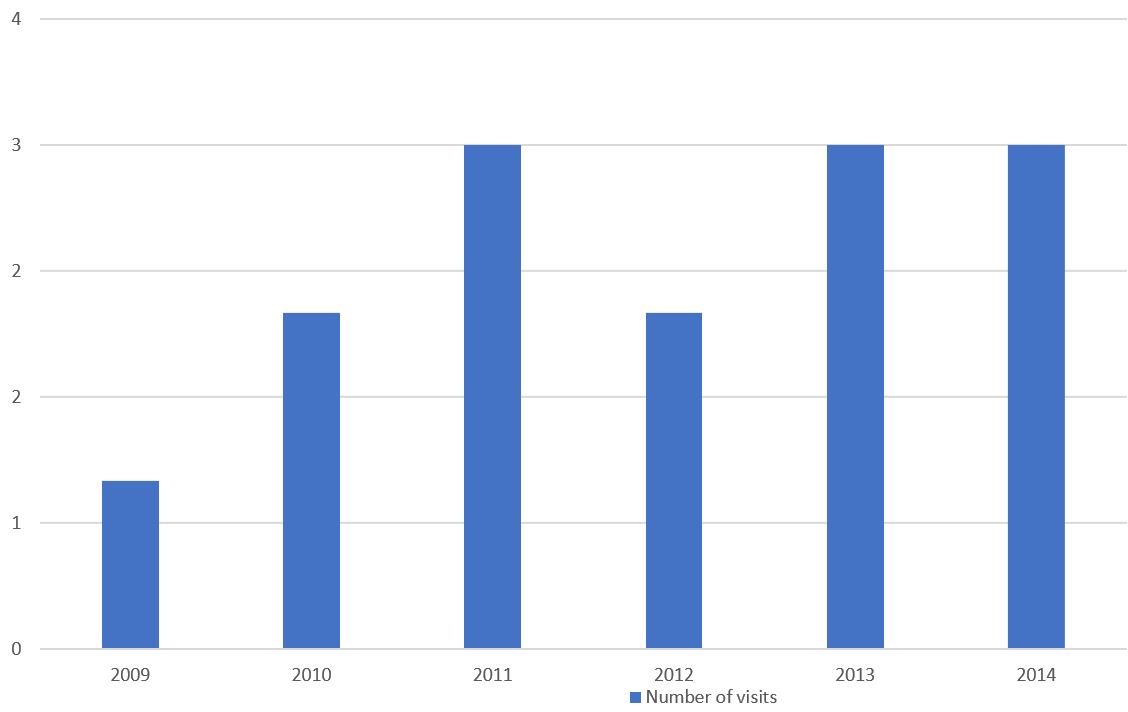
Based on the data from http://www.ciis.org.cn/english/2015-12/03/content_8424552.htm
With the gradual increase in the influence of the PRC in the world and the strengthening of the personal power of its leader, there was an objective need to reinforce the ambitious initiatives of the PRC, including the Belt and Road Initiative, in developing countries with an ideological setting, which could become a new basis for strengthening political trust. Probably, “China’s own one-party system" that Xi Jinping spoke about in 2018 worked as the base, but its promotion in partner states had begun long before that. In 2016, China increased the number of annual scholarships granted to African government leaders for training under the CPC programs (from 200 to 1,000). The training conducted by the CPC Central Party School covers the theory and practice of party building, propaganda techniques, cadre training and development, and management of interactions between the party, government, and military.
Figure 2. Number of African Political Party Delegations in China
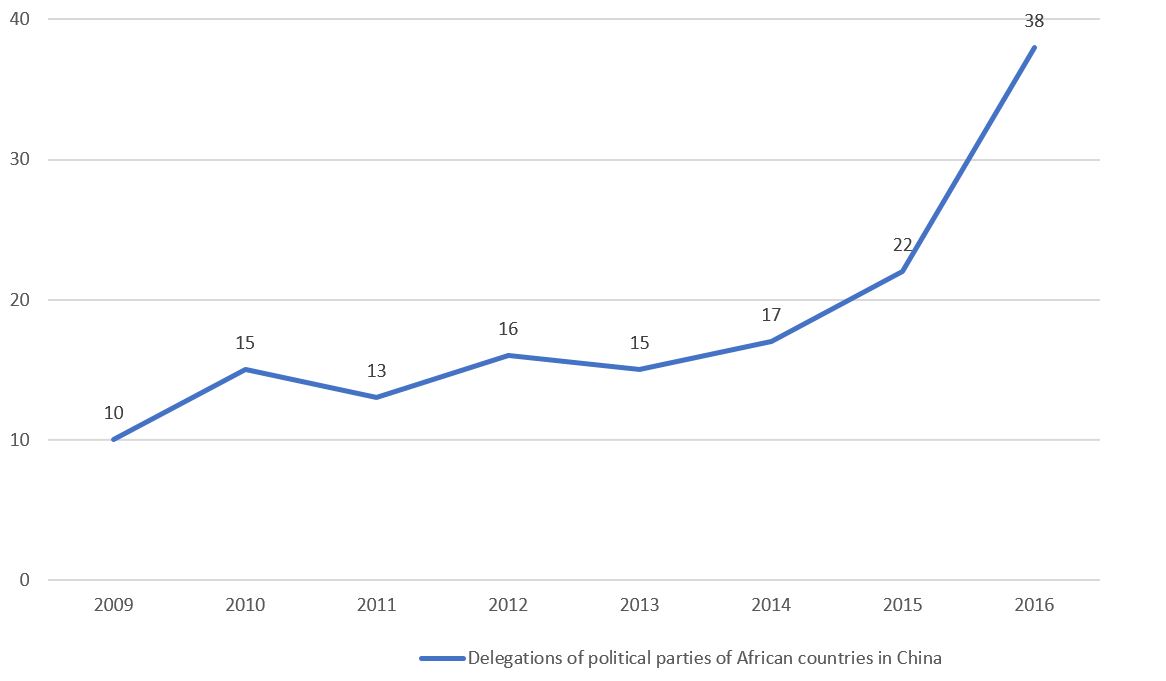
Source: Joshua Eisenman, Eric Heginbotham // China Steps Out: Beijing's Major Power Engagement with the Developing World // Routledge, 1st Edition / 438 pages, 2018.
The increase in the number of participants learning the “new type of political party system” by the Chinese model is becoming more noticeable. A similar trend was noticed right during Xi Jinping's term of office (see Figure 2). Recently the training was expanded to include “next generation leaders”. More than 200 Africans graduated from the program between 2011 and 2015, and Beijing said that it would increase this intake to 1,000 by 2018.
In 2018, the PRC held a major event on cooperation with the CPC, a dialogue with African political leaders, bringing together more than 40 political parties from over 36 countries. For comparison, before that, fewer party delegates from African countries attended different CPC events: in 2016 — 15; 2017 — 17. The increase in the number of exchanges can be traced quite clearly. In addition to African delegations, party representatives from Latin America, Central Asia, the Middle East, and Southeast Asia participate in many international events and at the invitation of the CPC.
It can be assumed that the inevitable expansion of China's economic presence in the world will be followed by intensified attempts to promote its political culture, which, although not an ideology, has similar goals. This includes laying the foundation for close cooperation with governments of countries sharing similar values. This is precisely what causes a certain clash between two management practices — the Western model based on democratic principles, and the new model proposed by the PRC. Following the advancement of the characteristic governance model, the PRC introduced certain elements of its political culture which brought the governance systems in other countries closer to Chinese realities. This gives China many opportunities to strengthen its position in certain regions and, of course, meets the goals of Xi Jinping, mentioned in his book, to eliminate the lack of understanding between China and other countries. This can probably be rephrased as follows: to better understand China, you need to become China. And for this purpose, a new type of political party system is an excellent alternative to the existing governance models. Just add — "with Chinese characteristics".
1. 习近平著 / 习近平谈治国理政。第一圈 // 北京:外文出版社,2018, p. 1
2. 习近平著 / 习近平谈治国理政。第一圈 // 北京:外文出版社,2018, p. 5.
(votes: 5, rating: 4.2) |
(5 votes) |
China’s soft power in Africa
China’s Trade Policy Shift as International Capacity Cooperation Policy RebrandedChina’s two-arm approach of strategically opening and closing will likely continue
The Thucydides’ Trap: the Avoidable Destiny Between the US and ChinaAs the Western philosopher George Santayana said, “those who cannot remember the past are condemned to repeat it.”


